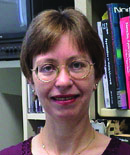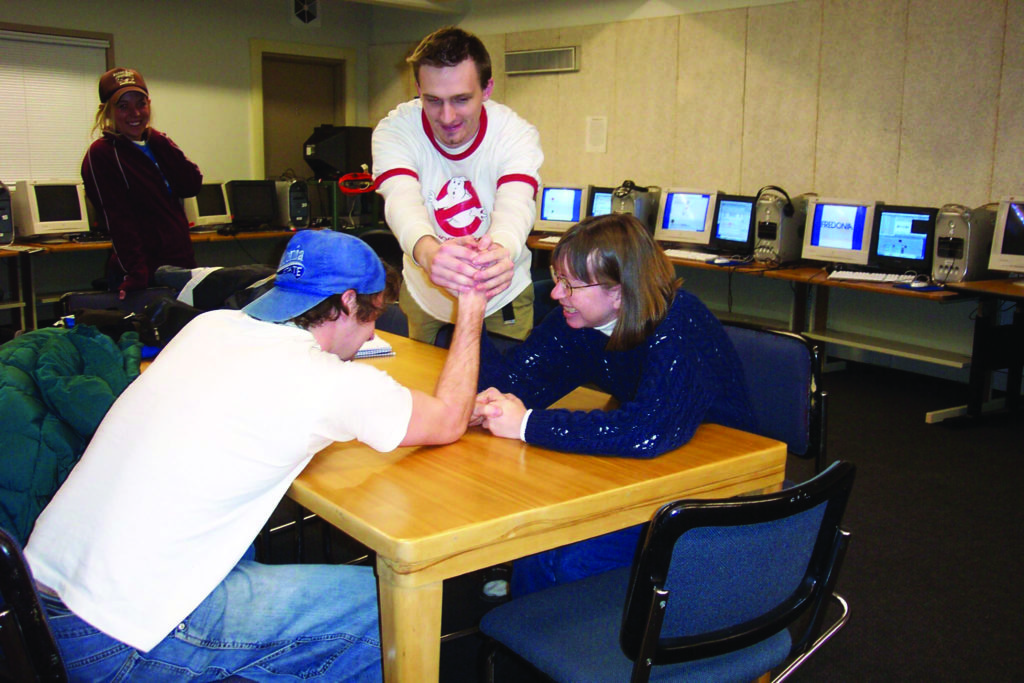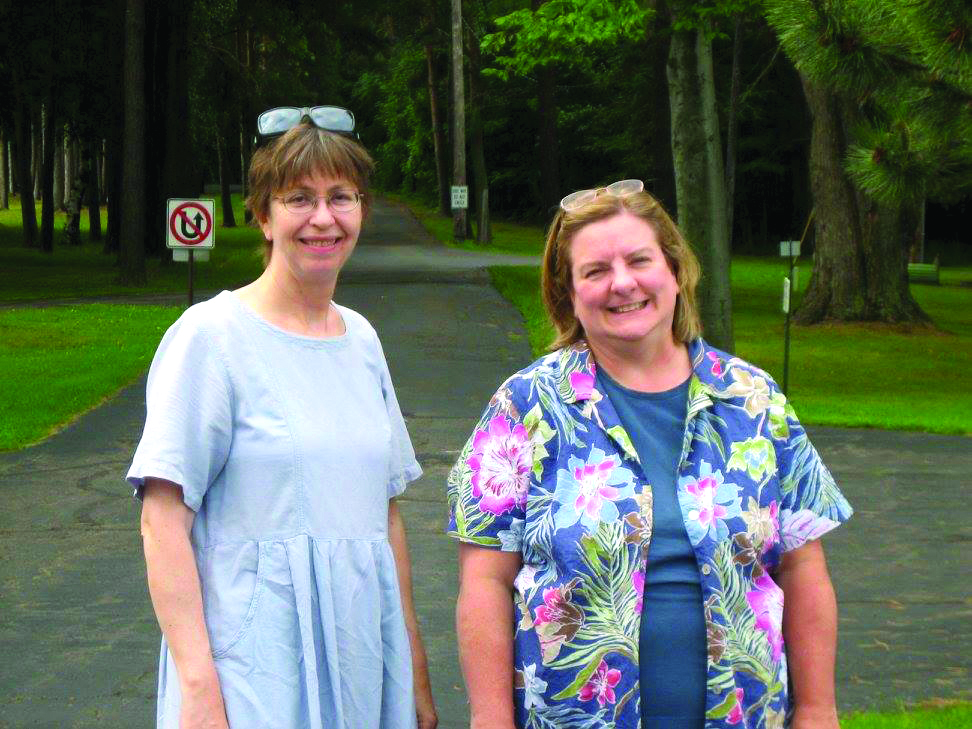COLIN PERRY and CONNOR HOFFMAN
Editor in Chief and Managing Editor

Kathleen McDonough had a hypothesis to test, and as fate would have it, she had found the perfect partner in crime.
She was standing in an elevator in McEwen Hall with communication professor Tracy Marafiote and Marafiote’s toddler son Elias when she remembered hearing somewhere that the ride down would feel completely different if you spread out horizontally instead of standing up.
“So she laid down on the elevator floor, and he laid down right next to her, and they just laid down three flights,” Marafiote remembers with a laugh.
It probably occurred to McDonough somewhere between the third and first floor that there actually wasn’t much of a difference at all, but she and Elias remained faithful to their experiment until its natural end. The fun was worth it regardless, as was the chance to guide yet another student on the path to greater knowledge.
McDonough, a communication professor and former department chair known simply as “Kay,” died on Oct. 3 after years of battling cancer. She was 62 years old.
If McDonough was not destined to end up at Fredonia, then it was certainly good luck. A native of San Rafael, California, she was born into a family where it was “always understood” that she would go to college, according to communication professor Laura Deen Johnson. However, the “what for” would remain a question.
She was passionate about film, but felt compelled by pragmatism to think of her future employment opportunities before ultimately deciding to pursue something else. She loved European history and even completed the coursework for a doctorate, but didn’t have the time to cross the finish line.
According to Johnson, it was the joy McDonough felt when she was working with young people that led her to teaching children and kindergarteners all around the world, in places like Indonesia and Italy. That life may have been enough for McDonough were it not for one bad flight home.
According to Marafiote, McDonough was on a long return trip back to the U.S. when her plane started experiencing serious difficulties. This was not just everyday turbulence; thousands and thousands of feet up in the air, McDonough thought that she was going to die.
There’s no way of knowing what happened exactly, but according to Marafiote, it was in that moment McDonough made a promise to herself: if they managed to land that plane and she survived, she was going to go back to film school like she had always wanted, and she was going to be a college professor.
And that’s exactly what she did.
McDonough joined the Communication Department in 2000 and helped continue the department’s tradition of offering courses in documentary filmmaking, according to communication professor and then-chair Ted Schwalbe.
Over the course of the next decade, she taught students not just the basics of film analysis but how they could create them on their own. Amber Rinehart, a former adjunct professor of the Communication Department, who also graduated from it with two majors, first met McDonough as a sophomore with an idea for a documentary film.
“I knew she taught documentary filmmaking, so I just walked into her office one day and introduced myself and asked if she could help me sort out ideas for a film,” Rinehart wrote in an online message. “Having never met me before, she sat down with me and talked me through my ideas and how I could make them into a film. That was our first introduction, but she helped me with just about every film or creative project I ever worked on after that.”
According to Rinehart, the very same documentary they discussed in their first meeting turned into her thesis documentary for graduate school. Of course, McDonough watched it and offered her critique before Rinehart submitted it to film festivals.
“Kay was always there for her students, even if you were not in one of her classes. She was kind, intelligent, passionate and always willing to help out any way she could. Whether it was questions about filmmaking or teaching, she was always there for me and for anybody else who needed her,” Rinehart said.
McDonough was recognized by colleagues and students for her fairness and her playfulness in equal measure. According to Fredonia graduate Gavin Mevius, one striking moment came on a night when his classmate Kevin Foley needed the Sheldon Computer Lab to stay open longer than usual. McDonough said that if Foley could beat her in an arm wrestling contest, she would oblige.
“I’m pretty sure she won, but kept it open regardless,” Mevius wrote on Facebook.

Of course, McDonough was more than just a professor. Johnson remembers her as a lover of great wine (naturally, from California); Marafiote recalls she was proud of her baklava and a big enough foodie that she began a tradition when the department was interviewing potential new hires.
“We would get to the end of the interview, and we always had a pretty comfortable rapport … and she’d go, ‘We have one final question, and this could be sort of a make or break thing for you,’” Marafiote said. “‘Now, we have a lot of department get-togethers, so what we’d like to know is if there’s a potluck, what would you bring?’ That was always the question that Kay would ask … That was just Kay.”
Being a Californian through and through, McDonough also had a longstanding rivalry with Schwalbe over their alma maters; Schwalbe’s graduate work was done at the University of Southern California, whereas McDonough was, according to Schwalbe, a “UC-Berkeley Cal fanatic.”
“We had a bet every year that she was here as to who would win the Cal-USC football game, and I must say that I got a lot of free cups of coffee thanks to Kay during those years,” Schwalbe said, laughing.
In 2012, Schwalbe stepped down from his second tenure as department chair, and McDonough was elected to replace him, going on to be (in his words) “outstanding.”
“Kay was always a person of the highest character,” Schwalbe said. “She was always a fair person, she made good decisions for the right reasons, and she treated people well. I knew she would make a good chair, and she did.”
Carl Lam, an adjunct professor in the Communication Department, as well as one of its graduates, first met McDonough when she had just been appointed to the position. Lam, who graduated from Fredonia with three majors (audio/radio production, journalism and music) and 200.5 credits, would end up paying McDonough semiannual visits every semester so that she could first wince, then sign his form to go over 18 credits.
“It showed that she never wanted to limit what I could do,” Lam said. “There were doubters that said, ‘You would be insane to take 28 credits.’ It was the validation that someone believed in me, and that she wasn’t going to let a number be limit of what I could do academically. That meant a lot to me. Regardless of what I was expected to do, or what they wanted me to do, she was going to be on my side.”
Johnson said that McDonough was always focused on what was best for both students and for her colleagues in the department.
“I always felt that she supported me in all of my work and activities, and I think she did that with everyone,” Johnson said. “She loved academia so much that she wanted it to be a positive environment, so that everyone could have that experience.”
Current chair of the Communication Department Mark Kiyak said that he and McDonough used to talk about its direction together and that she was a “very compassionate person.”
“She cared deeply about her students … she loved teaching, and she dedicated her life to teaching film,” Kiyak said. “I can only hope that my students care about me as much as they care about her.”

Her tenure as chair, however, would be cut short just two years later. According to Johnson, she had previously successfully dealt with melanoma of the eye, but a mysterious walnut-sized bump on her neck first evaded the doctor’s concerns until another showed up. It was first diagnosed as thyroid cancer which had spread, then salivary gland cancer, before finally settling on the rarely seen hyalinizing clear cell carcinoma. Johnson said that the top expert in the world for HCCC had only studied 40 cases.
Following the Fall 2013 semester, McDonough went away on medical leave to seek treatment. While her sister and brother-in-law had initially flown to New York to care for her, work meant they couldn’t stay forever. Johnson was helping McDonough run errands, whether it was shopping or driving to appointments, and others joined in to what ended up being known (to some) as “Kay’s posse.”
“There were about 20 people that were driving her,” Johnson said. “It included a dean, a lot of faculty members and good friends from the community.”
McDonough continued numerous treatments over the last two years, fueled by the frenzied research of Johnson and others and by miraculous stories of treatment like that of former U.S. President Jimmy Carter. Calls were made to Germany and to all across America. Earlier this year, she had been given a terminal diagnosis; however, a new clinical trial also gave her reason to hope. Even better, the trial would end up returning her to the place she loved: California.
“Just before she went to California, she went through a huge upswing and was very positive, and actually drove a few people to Roswell [Park Cancer Institute] herself,” Johnson said. “That gave me great hope, that she was going to be able to beat this thing.”
McDonough moved for what would be the final time back to her home state to participate in the trial. According to Johnson, “As things unfolded, it went very quickly, and … she was at peace.”
According to Kiyak, there are no current plans for a funeral, but he has entertained the thought of a Communication Department potluck in her honor — a fitting send-off if ever there was one.
The outpouring of fond memories and grief across Fredonia and the country is one illustration of how great McDonough’s impact was, as are the numerous students who went on to pursue their own passions because she pursued hers. And, of course, many of McDonough’s lessons continue to transcend textbooks and curricula.
“Looking back, I now realize that my biggest lessons I learned from her were not just about documentaries or teaching, but about life,” Rinehart said. “She taught me kindness and to always be the kind of person that walks [through life] helping others. She was a role model to so many in so many ways.”
